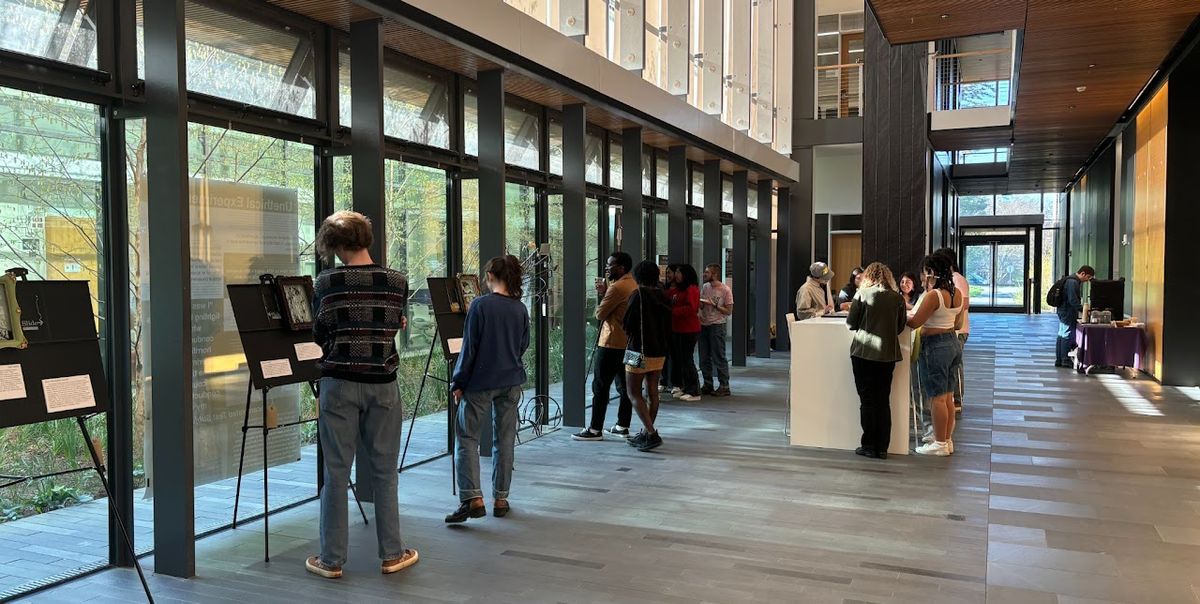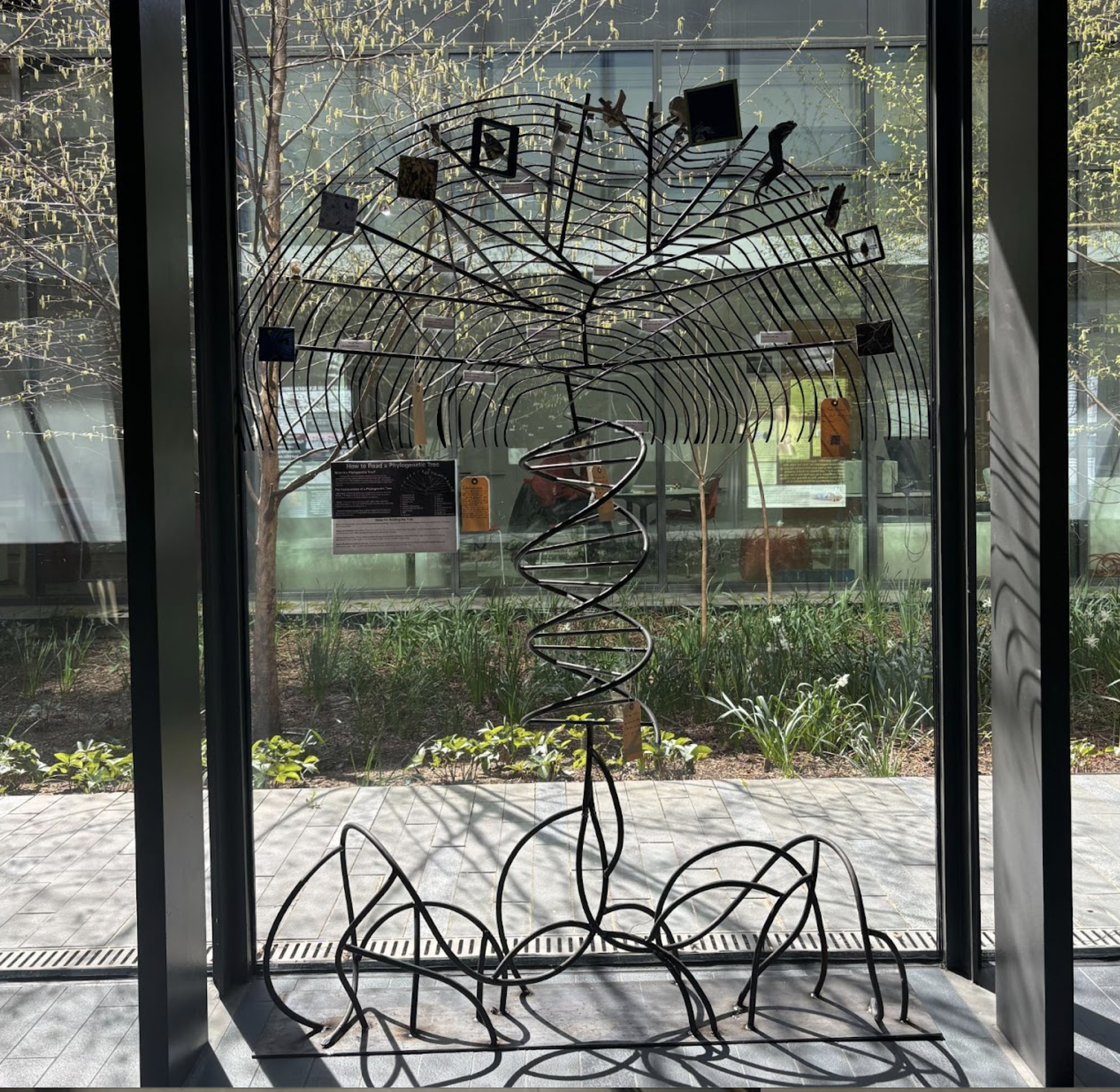How Interdisciplinary Majors Forge Their Own Paths
Having the opportunity to major in something that you’re passionate about is special. But what if that major doesn’t exist? Staff Writer Belaine Mamo ’27 addresses this question by sharing the experiences of four students who became interdisciplinary majors.

For a select group of students, answering the most common question you’ll be asked in college isn’t so simple. “What’s your major?” asks the distant relative at Thanksgiving. These students answer, “It’s complicated …”
For those who may not feel fulfilled by Amherst’s traditional majors, or are unsatisfied with the lack of minors, the college offers the unique opportunity to craft your own curriculum. But most students don’t know much about the interdisciplinary major program. I spoke with current and past interdisciplinary majors to better understand the experiences, joys, and challenges of choosing this path. While interdisciplinary majors offer independence and agency, it can be tough to write a thesis disconnected from departmental infrastructure and community.
Students can identify the area of study they feel is lacking within the college’s standard major offerings and put together their ideal coursework to explore this study, which must include classes from at least three departments. They must also write a justification for the major and a vision for their thesis to be supported by their chosen classes.
Daniya Ali ’25, a biochemistry major, designed a second interdisciplinary major to combine her passions for science and social issues. Her major, titled “Global Development and Technology,” combines courses from across the natural sciences, economics, political science, English, and more.
For her interdisciplinary thesis, which ties together ethnography and public health research, Ali will focus on “water quality issues due to toxins — heavy metals, azo dyes, etc.” in Punjab, Pakistan. One dye that Ali is studying is banned in the European Union, most of Asia, and the United States because of its link to health issues. Ali is tracking and mapping the spread of the dye throughout the water supply of Faisalabad, and will interview people in Pakistan on a visit during the January term.
When asked to reflect on her experience thus far, Ali recalled, “I’m so happy I did it. I went to Jordan [while studying abroad last spring] and learned about work in water, sanitation, and hygiene. It gave me good experience with qualitative thinking, independently creating something from an idea, and advocating for myself.” She was also able to connect with two scientists in Pakistan, a relationship that opened up the possibility of future collaboration.
However, Ali also explained that a lot of the time spent on her thesis was dedicated to her search for funding. Ali noted that it is comparatively easy for students within formal departments to find funds for thesis research and travel, but in an interdisciplinary major, this is not always possible. It was upsetting for her to drain herself on efforts unrelated to her actual project, as “a lot of brain-space was occupied by applying and getting money.”
In an interview with The Student, Assistant Professor of German Jonas Rosenbrueck, head of the Committee on Academic Standing and Special Majors which approves interdisciplinary majors, explained that students writing interdisciplinary theses are generally “encouraged to look to general college funding opportunities, speak with the Office of Fellowships to identify the right funding opportunities for their specific needs, or speak to their advisors.”
Interdisciplinary alumnus Zachary Watson ’24 faced funding problems similar to the ones Ali experienced. Watson’s thesis focused on equitable museum design through a combination of the history, science, and ethics of DNA sequencing, and the question, in his words, was “How can we [decenter stories from] Western visions and how do [those stories] currently affect the Global South?” Watson’s thesis titled “Us in Code” included a physical exhibition, a manifestation of his love of art along with biological issues.
Watson’s main motivation for declaring an interdisciplinary major was the desire to “delineate the requirements by what would be personally fulfilling” rather than having to take multiple required art or lab credits that he may not have had a personal interest in or connection with. This all contributed to Watson’s initial excitement in declaring the major, with his two advisors supporting him and his idea.
However, when he went to propose his major, the relatively blank interdisciplinary program website left him virtually in the dark — he had no timeline, examples, or suggestions.
Following the submission of his major proposal to the Committee on Academic Standing and Special Majors, Watson recalled that his application was returned with notes indicating that, in order to be accepted, he needed to begin research for his thesis that summer. To do that, Watson needed housing and funding, but without a formal department, it was hard to know where to go.
To complete his thesis, Watson got two on-campus jobs for the summer and worked 30-40 hours a week — all of the money he made was spent funding his fieldwork and research into equitable museum design.
While Watson was ultimately happy with his major, advisors, and thesis, he said that by the end of this process, he was unwell mentally. Watson noted that if the Committee on Academic Standing and Special Majors was more clear from the beginning on expectations about the conditions for acceptance and what the Committee is looking for in theses, the journey from the proposal to the major requirements would have been more straightforward.
Watson found that, through a good connection with his advisors, he was able to advocate for himself and have people to advocate for him, which eventually got him some funding from the art department and a spot for his exhibition amongst other art theses. He also urges interdisciplinary students to speak to him and each other because it seems “every experience is so different, but the challenges are usually the same.”
Biafra Okoronkwo ’20 echoed Watson’s earlier concerns, explaining that, when he designed his major in Global Public Health, there was limited information accessible to students regarding the program. Okoronkwo, currently a graduate student at Johns Hopkins University studying global mental health and community health, came to Amherst intending to be on the pre-med track, but became enamored with public health. His major included classes in anthropology, psychology, economics, and political science, and he also double majored in Arabic and what was then called Middle Eastern studies (now Asian languages & civilizations).
He studied abroad at the American University in Cairo, Egypt for two semesters. Okoronkwo advised students to take advantage of the Five College Consortium, crediting it with increasing the breadth of applicable coursework available to him as well as his enjoyment within the major. In fact, one of his University of Massachusetts, Amherst professors ended up being an advisor to his thesis that investigated why heart conditions were the foremost cause of death in Egypt and explored potential solutions for the issue.
Okoronkwo suggested that the college assemble a compilation of students’ previously approved proposals for guidance as well as possible timelines and information about who is on the committee for approval, which would allow more direct and informative communication with the committee members.

In an email to The Student, Hibiscus Zhang ’25 expressed that “pursuing my interdisciplinary major is not something that I have ever regretted.” Introduced to the Asian American Movement in high school, Zhang was captivated by the idea of an education in which he was “represented, empowered, and made whole.” This vision is what drew him to a major that allowed for engagement with Asian American studies, feminism, and diaspora.
Under his major, “Comparative Race, Migration, and Diasporic Feminist Studies in ‘Asian America,’” Zhang’s thesis will evaluate how the U.S. and South Korea utilized Cold War discourse on queerness to manage Korean sex workers on U.S. military bases in the Korean War. Zhang emphasized the importance of pursuing a course of study that is applicable outside of the classroom. He wants his historical research to be grounded in theory without overriding the women’s real lives and experiences he is investigating. Zhang found that the interdisciplinary program allowed him to handle these considerations.
Initially, he went looking for Asian American studies within departments throughout the Five Colleges, but, feeling unfulfilled with the lack of breadth in courses (prior to the introduction of the Asian American and Pacific Islander studies major earlier this year), applied for an interdisciplinary major. The major “was just a matter of providing shape and form to something that had been in the works since my very first semester of college,” Zhang said.
Though the interdisciplinary major allowed for the breadth of study Zhang was looking for, he also noted some of the drawbacks of its specificity, including a lack of a departmental community. “Since interdisciplinary majors are individually curated, there is not a sense of community that formal majors [or] departments have,” Zhang explained. “All of [my professors] have been incredibly helpful and encouraging … But because I had to build this community from scratch, I often feel excluded from the structured support that departments provide; outside of my friends, I don’t feel as if I have a formal community of peers that I can lean on or talk through ideas with.”
Watson urged the college to showcase the wide variety of interdisciplinary theses people have completed. He explained that “it would’ve been validating for the major to have the website … to show what people have done.” Nevertheless, he overall found it to be an amazing experience because “[it was] great practice in academics and self-discerning: learning how to do research that is valid and be able to withstand criticism from different disciplines.”
All the interdisciplinary majors remarked that their unique journeys helped them feel a greater sense of independence and empowerment. All advised potential interdisciplinary students to “be open and flexible” and to take advantage of the fact that “the school gives you the aptitude to go out and advocate for what you want.”





Comments ()